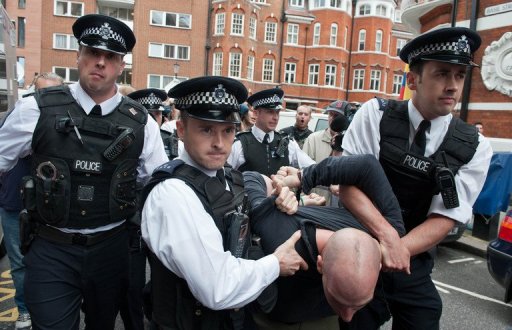Ecuador’s decision to grant asylum to WikiLeaks founder Julian Assange puts Britain in uncharted diplomatic and legal waters, as it insisted Thursday it would go ahead with extraditing him to Sweden.
When Ecuador’s Foreign Minister Ricardo Patino announced to applause in Quito that his government was giving the 41-year-old Australian political asylum, it raised a host of questions.
London reacted to the decision by insisting that, effectively, the decision from Quito changed nothing and that it intended to go ahead with extraditing Assange to Sweden as it is required to do under the European arrest warrant.
Prosecutors in Sweden want to question Assange about allegations made by two WikiLeaks volunteers that he raped or sexually abused them after a seminar two years ago.
Put simply, the problem for Assange and supporters of his whistleblowing website is how to get him out of the embassy and on to a plane.
For now, it appears that Assange has no option but to bed down for a long stretch in the Victorian redbrick building near the famed Harrods department store.
British police appear unlikely to storm the embassy, as Ecuador had claimed angrily on Wednesday.
Britain’s foreign minister William Hague admitted that the standoff could drag on for years.
Hague reacted to Quito’s decision by insisting that it effectively changed nothing and that London intended to go ahead with extraditing Assange to Sweden as it is required to do under the European arrest warrant.
Hague was blunt in his reading of the situation, saying that “we cannot give safe passage to somebody in this situation”.
He admitted that the situation “could (go on for months or years). It is, above all, a difficulty for Ecuador and for Mr Assange but this is a strange position for an embassy to be in this position”.
Hague said that “diplomatic immunity exists to allow embassies and diplomats to exercise proper diplomatic functions”.
The “harbouring of alleged criminals, or frustrating the due legal process in a country, is not a permitted function,” he added.
Lord Alex Carlile, a barrister by training from the ruling Liberal Democrat party, told BBC TV that while be believed that both Assange and the government of Ecuador had behaved “disgracefully”, Britain must now be patient.
He warned that if Britain stormed the embassy to remove Assange it could set a dangerous precedent for British embassies and diplomatic missions abroad.
He compared the situation to if a young Iranian woman facing death from stoning took refuge in the British embassy in Tehran, and Iranian authorities decided to extract her using force.
Speaking shortly after Assange took shelter in the embassy in June, Paul Whiteway, London Director of the Independent Diplomat consultancy, said Assange could be arrested even before leaving the embassy.
He added: “The inviolability of the embassy ought to extend to forms of transport, but even if he were able to get into a car, what would happen at the other end? How would he get into an aeroplane without being arrested?”

COMMENTS
Please let us know if you're having issues with commenting.